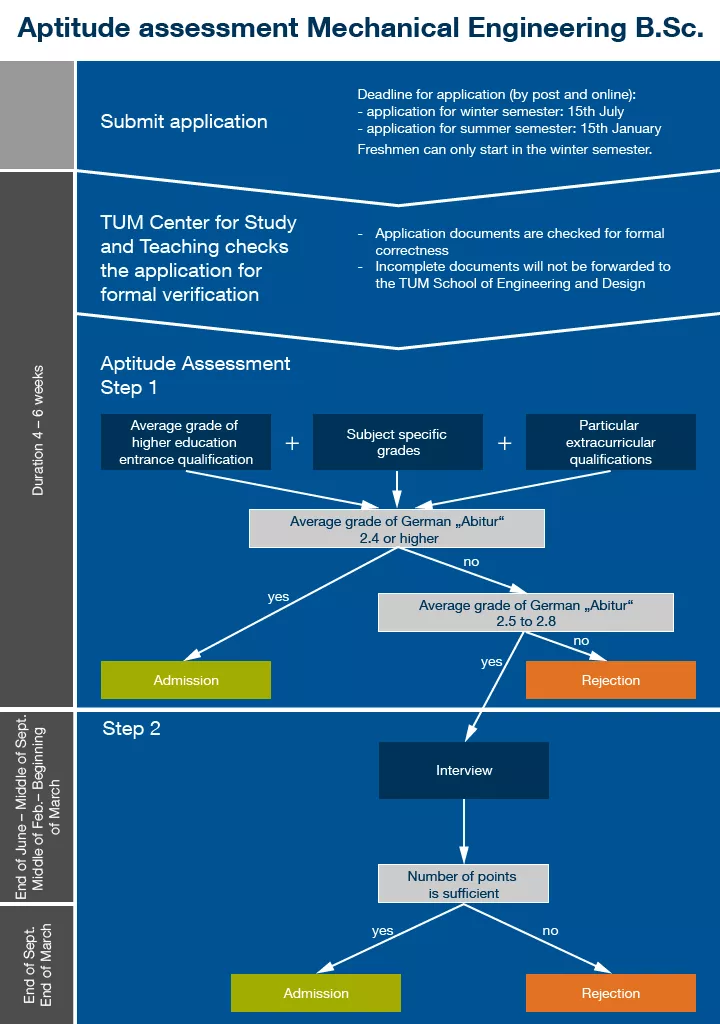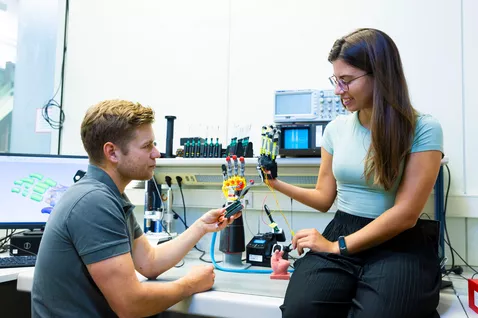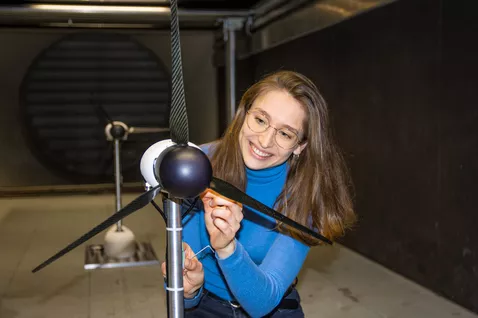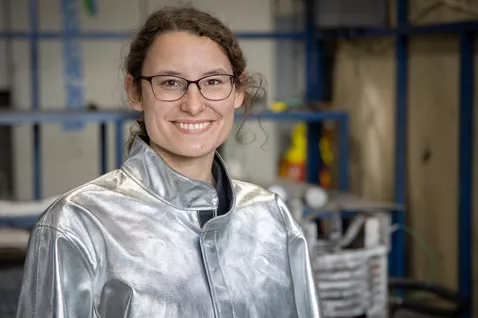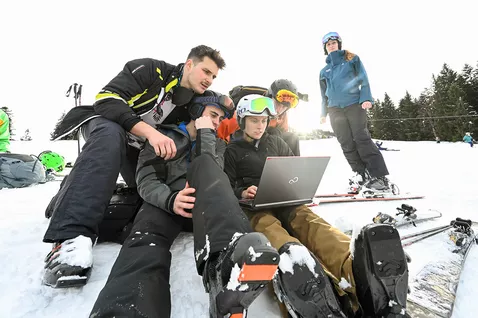Mechanical Engineering B. Sc.
Air taxis and hyperloop, teleoperated driving, the world's most efficient electric car, humanoid robots, high-tech sports equipment for national team athletes, flexible power plants for the energy turnaround, holistic design of wind power plants, extremely heat-resistant materials for fusion reactors, plastics with antimicrobial properties for hospital applications, devices for minimally invasive surgery, process optimization in the production of lithium-ion cells, CO2 as a carbon source for fuel and chemical production: All this and much more – that is mechanical engineering at TUM!
What you'll learn for your future?
In the fundamental part of the program, students are first introduced to the classical natural sciences of physics and chemistry as well as to mathematics and technical electricity. Students should be able to independently describe processes both qualitatively and mathematically-quantitatively and apply laws or formulas to defined problems.
This is expanded by basic subjects specific to mechanical engineering: Technical mechanics teaches students the ability to formulate and solve mechanical problems independently at an abstract mathematical level. Within the framework of the basics of machine drawing and machine elements, this knowledge is transferred to complex technical drawings, so that students can work out solutions for a production-, load- and assembly-compatible design of components, select suitable machine elements and represent them using CAD systems. In addition to elementary principles of information technology such as computer architecture, the analysis of real-time systems for given control systems and the programming language C are also part of the course. Basing on probability theory, the ability to model engineering problems with consideration of uncertainties is trained. The basic studies are completed by means of the modules materials science, control engineering, fluid mechanics, thermodynamics and heat transport. With this sound knowledge regarding scientific principles, theories and methods, students are able to successfully solve specified mechanical engineering problems with a clear solution path. Students e.g. are able to fulfill a pre-selection of suitable materials based on concrete material requirements, to describe a machine as a thermodynamic system and to design dynamic actively influenced systems.
More information on the B.Sc. Mechanical Engineering can be found on our TUM Mechanical Engineering Wiki.
Studying Mechanical Engineering at TUM
You are interested in studying Mechanical Engineering at TUM? In this video you can find out everything about what everyday life at TUM is actually like, what challenges the Bachelor's degree in Mechanical Engineering brings with it, and what opportunities graduates have to look forward to.
Impressions
In the modern, light-flooded building in the Garching Research Center, you'll find everything under one roof: lecture halls for teaching in the bachelor's degree program, professorships, workshops, laboratories and pilot plants, consulting and service facilities.
Type of Study: Full Time
Standard Duration of Studies: 6 Semester
Credits: 180 ECTS
Main Locations: Garching
Admission Category: Aptitude Assessment for Bachelor
Start of Degree Program: Winter Semester (October)
Application Period: Winter semester: 15.05. – 15.07.
Required Language Proficiency: German
Tuition Fees: for Students from Non-EU Countries
The standard period of study for the bachelor's degree in mechanical engineering is six semesters. This is divided into basic studies (1st to 4th semesters) and specialized studies in the 5th and 6th semesters. In the basic studies, there is a fixed timetable for each semester with lectures and exercises, which can be extended by tutorials – small learning groups with individual support.
In the 5th and 6th semesters, students choose their courses from an extensive catalog according to their interests and inclinations. The path to the desired specialization or to a broad engineering education is now open. From a catalog of subjects, they choose industry-specific courses according to their interests or put together a fundamentals-oriented, cross-industry schedule of classes:
- Energy and process engineering
- Development and design
- Vehicle and drive technology
- Aerospace engineering
- General mechanical engineering
- Theoretical mechanical engineering
- Management in mechanical engineering
- Mechatronics and robotics
- Medical technology and assistance systems
- Nuclear engineering
- Production and Logistics
The 1st semester builds on school knowledge that will be expanded throughout the academic year:
- Mathematics (e.g., systems of linear equations, vectors and matrices, differential and integral calculus, matrix factorizations, multidimensional calculus).
- Chemistry (e.g., atomic structure, bonding, chemical reactions, metals, nonmetals, organic chemistry)
- Physics (e.g. mechanics, electricity, optics)
Parallel to this, students delve into the fundamentals of
- Electricity theory (basics of drive technology as well as electronics)
- Engineering mechanics (bodies at rest in statics and elastostatics, time-independent deformations and stresses)
- Information technology (linking the fundamentals of electrical engineering with those of computer science to solve problems in mechanical and plant engineering)
- CAD and mechanical drawing (creation, understanding and analysis of technical drawings)
- Modeling uncertainties and data in mechanical engineering (probability theory, performing statistical tests, describing engineering problems in the presence of uncertainties)
- Soft skills in the student environment (workshops on how to start studying and how to organize the daily study routine in a goal-oriented way.
In the 3rd and 4th semesters, the following knowledge is taught on the basis of these fundamentals:
- Mathematics (Fourier series as well as Fourier and Laplace transforms, differential equations and integral transforms)
- Technical mechanics (kinematic systems)
- Control engineering (application of mathematical knowledge to the description of stability or damping as well as amplitude and phase frequency responses)
- Materials science (e.g. classification of materials, properties of materials)
- Machine elements (e.g. strength and design calculations, design of a gearbox)
- Fluid mechanics (e.g. behavior of liquid and gaseous media, conservation laws for mass, momentum and energy)
- Thermodynamics (e.g. main laws of thermodynamics, descriptions of states, circular processes)
- Heat transport phenomena (e.g. heat transport mechanisms, calculation of heat flows).
While the four-semester basic studies consist of compulsory modules, only elective modules are offered in the 5th and 6th semesters with the exception of the modules "Mathematical Tools" (translation of engineering problems into mathematical problems and their solution by application-oriented modeling) and "Bachelor's Thesis with scientific papers".
First-year students need proof of an at least eight-week preliminary internship, ideally when they start their studies in October. Goal of the internship is to gain experience in manufacturing and production, in industrial operations and in dealing with colleagues, employees. Information on the design and content of the internship, on the deferral of internships, on the recognition of vocational training and degrees, a.s.o. can be found in the Study Wiki at Prospective Students.
Please apply through the TUMonline application portal and upload your application documents.
All applicants who prove their eligibility will be admitted to the program. Criteria for suitability are:
- the average grade of the university entrance qualification, e.g. Abitur (high school diploma)
- subject-specific individual grades (mathematics, German and at least one science or computer science continued until the Abitur)
- extracurricular qualifications (e.g. apprenticeship, internships, participation in competitions).
Very good applicants are admitted directly.
All those who have passed the Abitur with an overall grade of approximately 2.5 to approximately 2.8 (guiding values) are invited to a selection interview. During this interview, candidates have the opportunity to convince their interview partners of their suitability for studying mechanical engineering.
Applicants with an overall grade above approx. 2.8 (guiding value) will be rejected directly.
Please note: If one or more subject-specific individual grades are not shown on your transcript, you will be invited for an interview despite having a very good Abitur.
Letter of motivation
An essential part of the application for aptitude testing is your written statement of reasons for choosing the course of study and for choosing the TUM as your university. This letter of motivation should not exceed two DINA4 pages and must be written in German. It must – as you confirm with your signature on the application form – be written independently and without the help of others. Among other things, you should explain in it which skills, specific talents, interests and career ideas make you particularly suitable for the intended course of study at TUM. Additional information about your personal background or special qualifications such as extracurricular activities can also contribute to this (please enclose supporting documents).
Selection interview
In the second stage of the aptitude test, you will be invited to a 20-minute interview with a professor from the TUM School of Engineering and Design. You will receive information about the procedure via the invitation. It is intended to show whether you can independently and responsibly achieve the goal of the degree program with its research-oriented orientation on a scientific basis.
The interview covers
- mathematical knowledge that can be applied to solve engineering problem areas
- knowledge from the fields of engineering and natural sciences and the ability to apply common concepts and terms to engineering problem areas
- ability to combine knowledge from methodologically fundamentally different subject cultures for an interdisciplinary problem-solving strategy
- extracurricular qualifications relevant to the course of study
- language competence
TUM will notify the mandatory date of the interview by e-mail. There is no right to postpone the fixed date.
Further information on the aptitude assessment procedure, such as the relevant statutes, can be found in the Wiki.
The application procedure at a glance:
